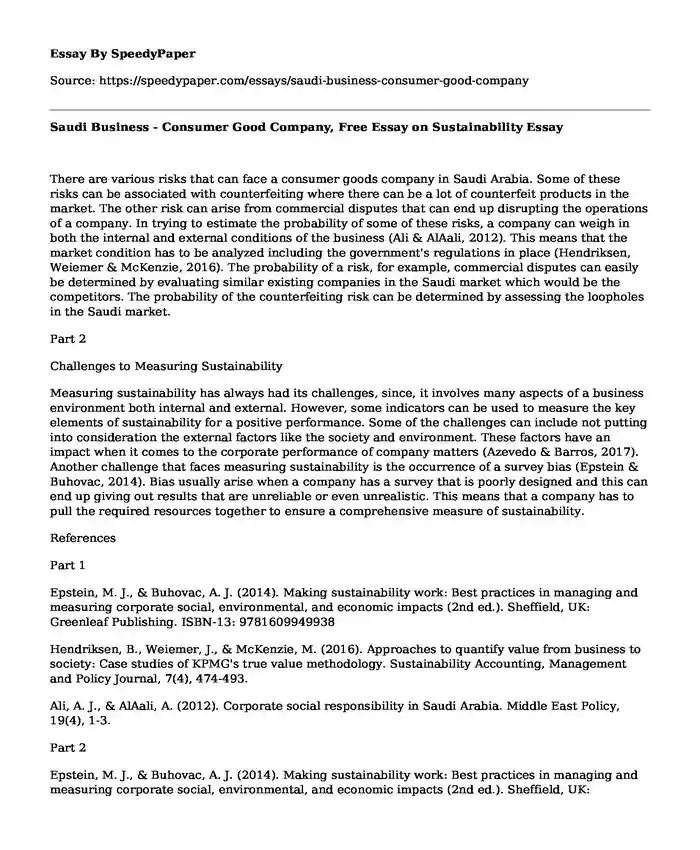There are various risks that can face a consumer goods company in Saudi Arabia. Some of these risks can be associated with counterfeiting where there can be a lot of counterfeit products in the market. The other risk can arise from commercial disputes that can end up disrupting the operations of a company. In trying to estimate the probability of some of these risks, a company can weigh in both the internal and external conditions of the business (Ali & AlAali, 2012). This means that the market condition has to be analyzed including the government's regulations in place (Hendriksen, Weiemer & McKenzie, 2016). The probability of a risk, for example, commercial disputes can easily be determined by evaluating similar existing companies in the Saudi market which would be the competitors. The probability of the counterfeiting risk can be determined by assessing the loopholes in the Saudi market.
Part 2
Challenges to Measuring Sustainability
Measuring sustainability has always had its challenges, since, it involves many aspects of a business environment both internal and external. However, some indicators can be used to measure the key elements of sustainability for a positive performance. Some of the challenges can include not putting into consideration the external factors like the society and environment. These factors have an impact when it comes to the corporate performance of company matters (Azevedo & Barros, 2017). Another challenge that faces measuring sustainability is the occurrence of a survey bias (Epstein & Buhovac, 2014). Bias usually arise when a company has a survey that is poorly designed and this can end up giving out results that are unreliable or even unrealistic. This means that a company has to pull the required resources together to ensure a comprehensive measure of sustainability.
References
Part 1
Epstein, M. J., & Buhovac, A. J. (2014). Making sustainability work: Best practices in managing and measuring corporate social, environmental, and economic impacts (2nd ed.). Sheffield, UK: Greenleaf Publishing. ISBN-13: 9781609949938
Hendriksen, B., Weiemer, J., & McKenzie, M. (2016). Approaches to quantify value from business to society: Case studies of KPMG's true value methodology. Sustainability Accounting, Management and Policy Journal, 7(4), 474-493.
Ali, A. J., & AlAali, A. (2012). Corporate social responsibility in Saudi Arabia. Middle East Policy, 19(4), 1-3.
Part 2
Epstein, M. J., & Buhovac, A. J. (2014). Making sustainability work: Best practices in managing and measuring corporate social, environmental, and economic impacts (2nd ed.). Sheffield, UK: Greenleaf Publishing. ISBN-13: 9781609949938
Gatzert, N., & Schmit, J. (2016). Supporting strategic success through enterprise-wide reputation risk management. The Journal of Risk Finance, 17(1). 26-45.
Azevedo, S., & Barros, M. (2017). The application of the triple bottom line approach to sustainability assessment: The case study of the UK automotive supply chain. Journal of Industrial Engineering and Management, 10(2), 286-322.
Cite this page
Saudi Business - Consumer Good Company, Free Essay on Sustainability. (2022, Mar 14). Retrieved from https://speedypaper.com/essays/saudi-business-consumer-good-company
Request Removal
If you are the original author of this essay and no longer wish to have it published on the SpeedyPaper website, please click below to request its removal:
- Household Bleaches - Chemistry Essay Sample
- Organizational Metaphors Essay, Free Example for You
- Transition in Professional Nursing Role, Free Essay from Our Database
- Essay Example for Everyone: Main Principles of Marketing Mix
- Ethical Loyalty - Case Study Paper Sample
- Essay Example on Issues in Society Arose Due the Internet and Social Media
- Jane Eyre's Relations to Conflicts, Character Analysis Essay Example
Popular categories





